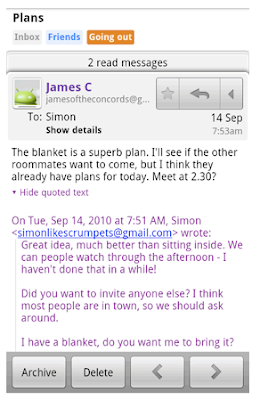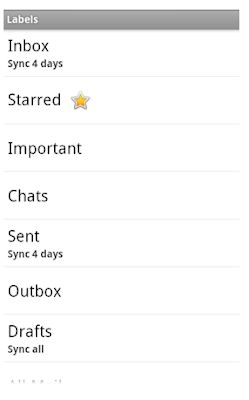It’s been a week since we
launched Priority Inbox, and now that you've hopefully had a chance to try it out, we wanted to share some tips to help you manage your email more efficiently. Here are five ways you can make Priority Inbox work even better for you:
1. Customize your sectionsBy default, Priority Inbox has three sections: "Important and Unread," "Starred" and "Everything Else.” But that doesn't mean you have to leave them that way. You can make a section show messages from a particular label (like your “Action” or “To-do” label), add a fourth section, or change the maximum size of any section. Visit the
Priority Inbox tab under Settings to customize your sections, or do it right from the inline menus.
 2. Train the system
2. Train the systemIf Gmail makes a mistake, you can help it learn to better categorize your messages. Select the misclassified message, then use the importance buttons at the top of your inbox to correctly mark it as important or not important.

For those of you who can't live without
keyboard shortcuts, don’t worry, you can use the "+" and "-" keys to adjust importance as well.
3. See the best of your filtered messagesYou can set up Priority Inbox to show you not just the best of your inbox, but also the best of messages you filter out of your inbox and might otherwise miss. Just change your Priority Inbox settings to “Override filters” and Gmail will surface any important messages that would otherwise skip your inbox.

With this option turned on, you can use filters to archive more aggressively and worry less about missing an important message.
4. Use filters to guarantee certain messages get marked important (or not)If you read and reply to a lot of messages from your mom, Gmail should automatically put incoming messages from her in the “Important and unread” section. But if you want to be 100% sure that all messages from your mom (or your boss, boyfriend, client, landlord, etc.) are marked important, you can
create a filter for messages from that sender and select “Always mark as important.” Similarly, if you regularly read messages from your favorite magazine, they should automatically get marked as important. If you’d rather they end up in the “Everything else” section, you can create a filter to never mark them as important.
5. Archive unimportant messages quicklyOne of the features that can help make you more efficient is the ability to archive all of the visible messages in the "Everything Else" section at once. Just click on the down arrow next to "Everything Else" and select the "Archive all visible items" option. If you want to be able to archive even more messages at once, you can increase the maximum number of messages that show in that section from the same drop-down.

































 Don't remember what prompted the most recent email in a thread? Now you can view previous message content more easily, just like in the desktop version of Gmail. Tap “Show quoted text” to reveal the previous message.
Don't remember what prompted the most recent email in a thread? Now you can view previous message content more easily, just like in the desktop version of Gmail. Tap “Show quoted text” to reveal the previous message. Finally, this updated version of the Gmail app has limited support for
Finally, this updated version of the Gmail app has limited support for  The Gmail update requires Froyo (Android version 2.2), so it’s available if you have a Nexus One, HTC EVO, Motorola Droid 2 or Motorola Droid. (Not sure if your device is running Android version 2.2?
The Gmail update requires Froyo (Android version 2.2), so it’s available if you have a Nexus One, HTC EVO, Motorola Droid 2 or Motorola Droid. (Not sure if your device is running Android version 2.2? 






 or
or  buttons at the top of the inbox to correctly mark a conversation as important or not important. (You can even set up filters to always mark certain things important or unimportant, or rearrange and customize the three inbox sections.)
buttons at the top of the inbox to correctly mark a conversation as important or not important. (You can even set up filters to always mark certain things important or unimportant, or rearrange and customize the three inbox sections.)